

Neuroscience Says Doing This 1 Thing Makes You Just as Happy as Eating 2,000 Chocolate Bars. How to Motivate Yourself to Do Things You Don’t Want to Do. Executive Summary No matter how generally motivated you are, all of us have some tasks that we don’t want to do. Maybe we find them boring, pointless, draining, time consuming, annoying, or anxiety producing. So how do you get motivated in these types of situations? The first step is to recognize that getting motivated doesn’t mean that you have to experience a particular feeling. You can decide to do something without ever getting excited about it by finding a personally meaningful reason to do it. How I Rewired My Brain to Become Fluent in Math - Nautilus - Pocket.
I was a wayward kid who grew up on the literary side of life, treating math and science as if they were pustules from the plague.
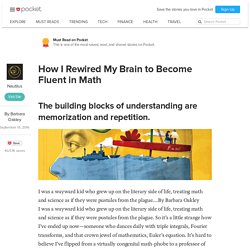
Why Talented People Don’t Use Their Strengths. Executive Summary Experts have long encouraged people to “play to their strengths.”

But based on my observations, this is easier said than done, because we often undervalue what we inherently do well. As a leader, the challenge is not only to spot talent but also to convince your people that you value their talents and that they should, too. Begin by identifying the strengths of each member of your team. Mental Models: How to Train Your Brain to Think in New Ways - James Clear - Pocket. You can train your brain to think better.
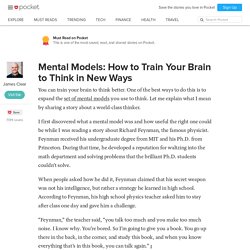
One of the best ways to do this is to expand the set of mental models you use to think. Let me explain what I mean by sharing a story about a world-class thinker. I first discovered what a mental model was and how useful the right one could be while I was reading a story about Richard Feynman, the famous physicist.
Study: Tetris is a great distraction for easing an anxious mind. The Math Behind The 5-Hour Rule: Why You Need To Learn 1 Hour Per Day Just To Stay Relevant. “Knowledge has to be improved, challenged, and increased constantly, or it vanishes.” — Dr.

Peter Drucker Three years ago, I coined the term The 5-Hour Rule after researching the most successful, busy people in the world and finding that they shared a pattern: They devoted at least 5 hours a week to deliberate learning. Masseter Muscle Massage for Tension Headaches and Jaw Release. How To Upgrade Your Subconscious “Normal” Every 90 Days. Your “normal” life reflects the level of your subconscious mind.
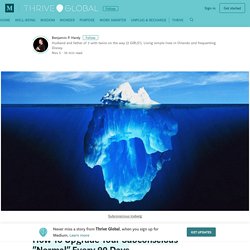
Your subconscious determines 95% percent of your behavior. A List Of 8 Core Values I Live By. Your character is defined by values.

And your core values are the result of your behavior. Aristotle said it best: “Men acquire a particular quality by constantly acting in a particular way.” For example, when you always tell the truth, you become an honest person. How To Feel Amazing Before 8AM – Benjamin P. Hardy. In the first 60–120 minutes of your day, you can change your entire life.

You can routinely get yourself into a “peak” or heightened state of mind and then operate from that state for the remainder of your day. It’s strange, though, that most people won’t do this. Most people are content pulling themselves out of bed and then dragging themselves through their day. Most people begin with negative momentum and continue with negative momentum.
Most people’s days are highly reflective of their past. How to Get Better at Reading People from Different Cultures. The five types of mentors you need in your life. iStock Here’s how to assemble your personal dream team, with tips from business expert Anthony Tjan.
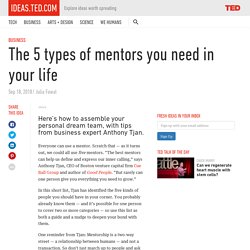
Everyone can use a mentor. Scratch that — as it turns out, we could all use five mentors. “The best mentors can help us define and express our inner calling,” says Anthony Tjan, CEO of Boston venture capital firm Cue Ball Group and author of Good People. Finding Comfort in Small Spaces. Jessica Gross | Longreads | September 2018 | 11 minutes (2,864words) In January of 2014, I rode a train from New York to Chicago, then back again.

My little cabin had been provided by Amtrak: a “test run” of what later became the Amtrak Residency. In an essay for The Paris Review Daily, I tried to explain — that is, explain to myself — what trains offer writers, and, particularly, me. I arrived at the sense of containment I felt, bound by the train car and, even more so, by the little private bedroom that ensconced and held me. What I didn’t say in that essay is that, when I began the journey, I was very, very lonely. On Sunday, before my train home and after an obligatory visit to the Bean, I took myself to the Art Institute of Chicago. Why Your Brain is Wired for Pessimism—and What You Can Do to Be More Optimistic. Illustration by Alicia Tatone We’ve evolved to expect the worst.
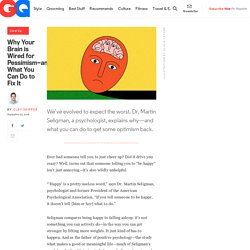
Dr. Martin Seligman, a psychologist, explains why—and what you can do to get some optimism back. Ever had someone tell you to just cheer up? Did it drive you crazy? “‘Happy’ is a pretty useless word,” says Dr. Everything You Fight Has Power Over you. Everything You Accept Doesn’t. We continuously seek answers outside of ourselves. We look for them in self-help books, podcasts, seminars, mentors, and spiritual teachers. But continually looking outside ourselves for answers isn’t exactly a vote of confidence in the expression of our soul’s calling. Eventually, to find our answers, we must turn inward. But going inward requires us to brave the wilderness, explore uncharted territory, and in the words of my friend AJ Leon, not follow well-lit paths, but grab a machete and hack our own. Oculus. This item has been hidden This item has been hidden Hardware and Updates Play all Cutting-edge technology is at the core of everything we do at Oculus. Take a closer look at the innovations and updates driving our platforms. 4:52 0:38 0:17 0:12 0:49 1:39 0:18 0:54 0:06 0:15 View 10 more This item has been hidden.
The best way to learn is drawing, even if you're no artist — Quartzy. “I just can’t draw.” It’s a refrain most adults say when confronted with a blank piece of paper. How To Get Rid Of The Thoughts That Are Clogging Your Brain. I want to ask you a question. How many hours per day do you think? “I never thought about that.” So let me get this straight. Blissing Out, Berkeley Style. Here's how to learn anything, according to a leading expert. The 3 Stages of Failure in Life and Work (And How to Fix Them) What’s Your Type? The Myers-Briggs Test and the Rise of the Personality Quiz. In 1943, a failed mystery novelist named Isabel Briggs Myers started a career in the new field of personality testing. Why work is exhausting even when it involves no physical labor. The 2,000-year-old origins of EQ and how it became a crucial job skill.
Two psychologists have a surprising theory on how to get motivated — Quartz at Work. Why ‘Find your passion!’ may be bad advice. 4 simple exercises to strengthen your attention and reduce distractibility. Our attention gets hijacked by everything from the stress in our lives to the ding of our phones. Neuroscientist Amishi Jha shows how we can cultivate the ability to focus on what really matters. How Aristotle is the perfect happiness guru. How this optical illusion made me question my reality.
The Wandering Mind, Neuroticism, and the Suffering of Creative Genius. I have two children, and they are a study in contrasts: My son works at a gym designing and building rock-climbing walls; In his spare time, he climbs them. My daughter is a Ph.D. student in immunology; In her spare time, she writes novels. 15 Morning Habits to Boost Your Creativity All Day. No matter how much truth there may be to that old saying about the early bird getting the worm, we can’t all be morning people. Thoreau on Nature as Prayer. How to Develop Sherlock Holmes-Like Powers of Observation and Deduction.
Ed Tronick and the “Still Face Experiment” – The Thoughtful Animal. In 1975, Edward Tronick and colleagues first presented the “still face experiment” to colleagues at the biennial meeting of the Society for Research in Child Development. The Relativity of Wrong by Isaac Asimov.